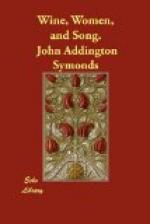Such are some of the stereotyped ideas which crowd our mind when we reflect upon the Middle Ages. They are certainly one-sided. Drawn for the most part from the study of monastic literature, exaggerated by that reaction against medievalism which the Renaissance initiated, they must be regarded as inadequate to represent the whole truth. At no one period between the fall of the Roman Empire and the close of the thirteenth century was the mental atmosphere of Europe so unnaturally clouded. Yet there is sufficient substance in them to justify their formulation. The earlier Middle Ages did, in fact, extinguish antique civility. The later Middle Ages did create, to use a phrase of Michelet, an army of dunces for the maintenance of orthodoxy. The intellect and the conscience became used to moving paralytically among visions, dreams, and mystic terrors, weighed down with torpor, abusing virile faculties for the suppression of truth and the perpetuation of revered error.
It is, therefore, with a sense of surprise, with something like a shock to preconceived opinions, that we first become acquainted with the medieval literature which it is my object in the present treatise to make better known to English readers. That so bold, so fresh, so natural, so pagan a view of human life as the Latin songs of the Wandering Students exhibit, should have found clear and artistic utterance in the epoch of the Crusades, is indeed enough to bid us pause and reconsider the justice of our stereotyped ideas about that period. This literature makes it manifest that the ineradicable appetites and natural instincts of men and women were no less vigorous in fact, though less articulate and self-assertive, than they had been in the age of Greece and Rome, and than they afterwards displayed themselves in what is known as the Renaissance.
With something of the same kind we have long been familiar in the Troubadour poetry of Provence. But Provencal literature has a strong chivalrous tincture, and every one is aware with what relentless fury the civilisation which produced it was stamped out by the Church. The literature of the Wandering Students, on the other hand, owes nothing to chivalry, and emanates from a class which formed a subordinate part of the ecclesiastical militia. It is almost vulgar in its presentment of common human impulses; it bears the mark of the proletariate, though adorned with flourishes betokening the neighbourhood of Church and University.
III.
Much has recently been written upon the subject of an abortive Renaissance within the Middle Ages. The centre of it was France, and its period of brilliancy may be roughly defined as the middle and end of the twelfth century. Much, again, has been said about the religious movement in England, which spread to Eastern Europe, and anticipated the Reformation by two centuries before the date of Luther. The songs




